A Guide to Independent Living Skills Assessment
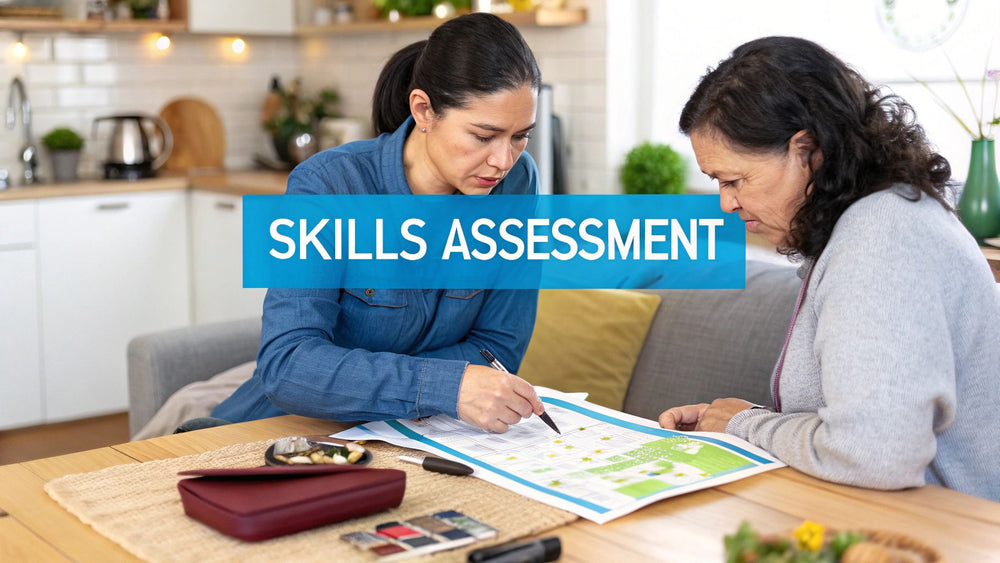
An independent living skills assessment is all about understanding where you are right now so we can figure out the best way to get you where you want to be. It’s a supportive, collaborative process, not a test with a pass or fail grade.
Think of it as creating a roadmap to greater freedom. It highlights all the things you’re already great at while zeroing in on the specific areas where the right support can make a real difference.
What an Independent Living Skills Assessment Really Is
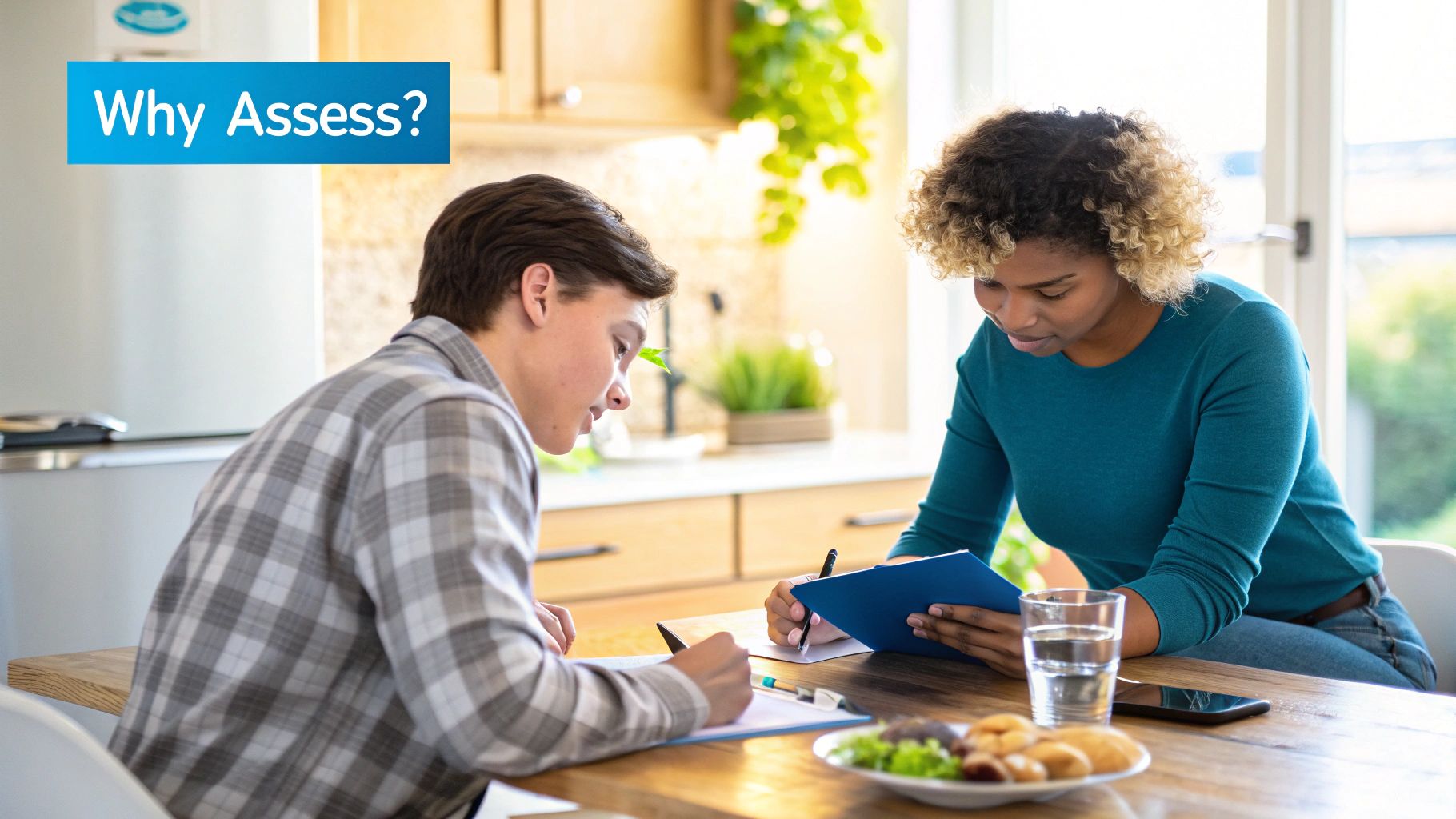
It’s best to view an independent living skills assessment as a personal ‘skills audit’ you do alongside a supportive coach, rather than a formal, rigid exam. The whole point is to build a clear, detailed picture of your abilities in all the different parts of day-to-day life.
This isn’t about judging your performance. It's about empowering you by pinpointing your strengths and identifying where learning new skills could open up a world of choice and opportunity. The process is incredibly helpful for anyone looking to build their capacity, especially NDIS participants or young adults preparing to live on their own for the first time.
A Collaborative Path to Freedom
The entire experience is designed to be positive and encouraging. You’ll typically work with an assessor, often an Occupational Therapist, who will take the time to understand your personal goals and what independence looks like to you.
This partnership ensures the focus stays exactly where it should be: on what you want to achieve. That could be anything from mastering a new recipe and navigating public transport confidently to managing your own budget.
The ultimate goal is to provide a solid foundation for greater autonomy. The assessment acts as the blueprint, showing precisely which supports and training will help you build the life you want to live, on your own terms.
Here in Australia, these assessments are a vital tool for supporting people with disabilities. They help evaluate everyday life skills like personal care, managing money, and communication. This personalised approach is the key to achieving genuine independence.
To see how these principles come to life, you can explore our guide on understanding Supported Independent Living (SIL) services.
The Key Life Skills Covered in Your Assessment
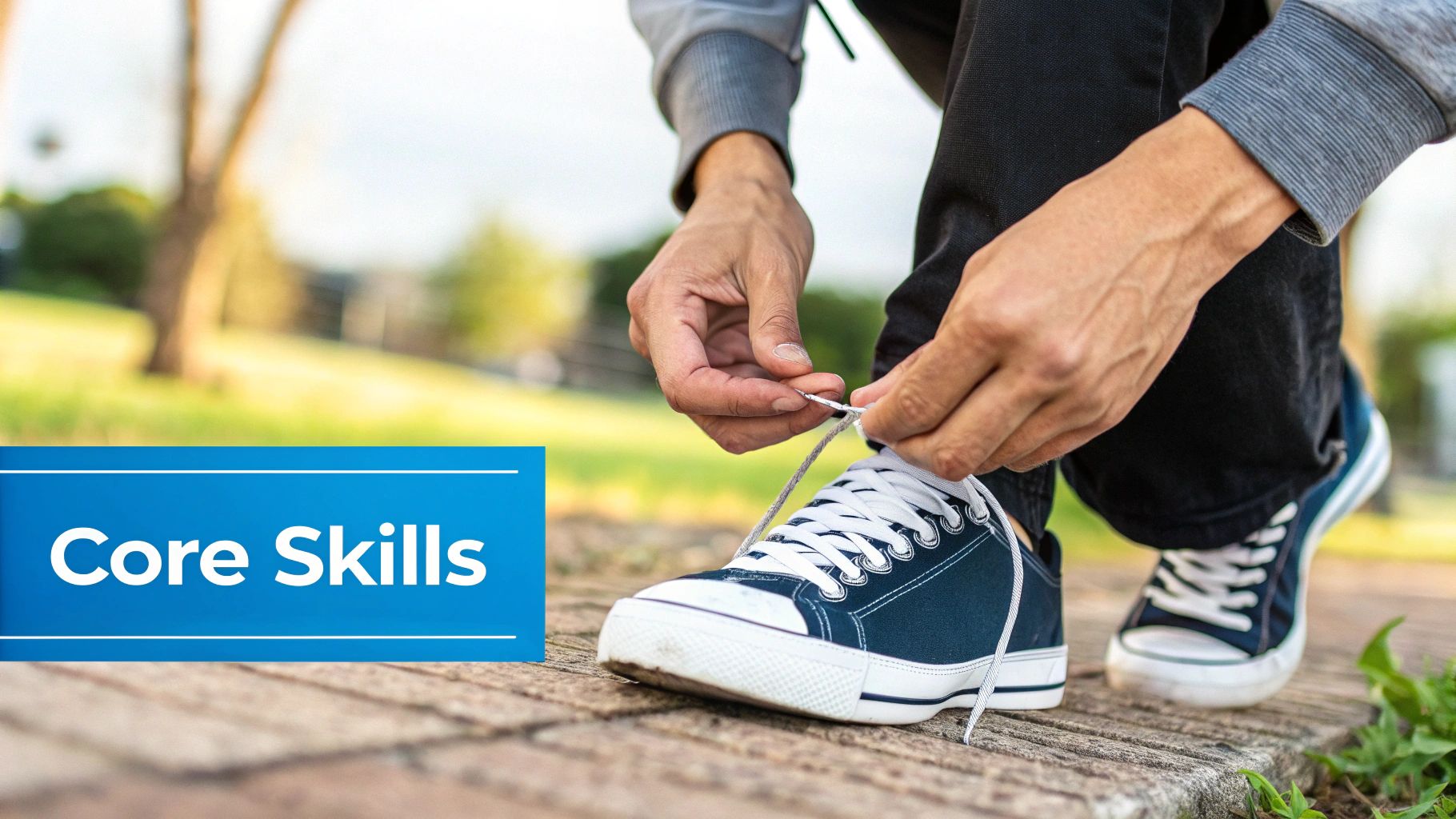
An independent living skills assessment isn't just a tick-and-flick exercise. It’s a deep dive into the practical, real-world abilities that make up everyday life. The whole point isn't to focus on what you can't do, but rather to get a clear picture of your current skills so we can see where the right support will help build your confidence and independence.
Every part of the assessment is framed around your personal goals. We’re always asking, "Why is this skill important to you?" This helps connect the dots between the skills themselves and your vision for a more independent life, giving us a complete picture of your strengths and ambitions.
An assessment looks at a wide range of skills. While every person is different, the evaluation generally explores several core areas of daily life.
Here's a breakdown of the key domains we typically look at in an assessment and some of the practical skills they cover.
Key Domains in an Independent Living Skills Assessment
| Domain | Skills Assessed (Examples) |
|---|---|
| Daily Living & Home Management | Planning and cooking meals, grocery shopping, cleaning and laundry, organising personal spaces, home safety awareness (e.g., what to do in an emergency). |
| Personal & Financial Skills | Grooming and personal hygiene routines, managing medication, dressing appropriately, creating a personal budget, paying bills on time, using bank services. |
These domains give us a structured way to understand where you're at and where you want to be, ensuring no stone is left unturned.
Daily Living and Home Management
This is about much more than just doing chores. It’s about the skills you need to run your own home—to create a space that’s safe, comfortable, and truly yours. Think of it like being the CEO of your own household.
An assessor will look at your ability to manage the everyday tasks that make a house feel like a home. This often includes:
- Meal Preparation: Everything from planning what to eat and shopping for ingredients to safely preparing a meal and handling leftovers.
- Household Cleaning: Keeping your living space hygienic, doing the laundry, and keeping your personal areas organised.
- Home Safety: This could be knowing who to call in an emergency, understanding basic first aid, or knowing how to keep your home secure.
Personal and Financial Skills
This part of the assessment gets down to the fundamentals of looking after yourself and managing your money. It’s all about having the skills and confidence to handle your personal needs and make smart financial choices.
An assessment in this area provides a clear roadmap to becoming more self-reliant. It pinpoints exactly how you can take charge of your personal routines and finances, which is a huge step towards genuine independence.
Some of the key skills we evaluate here are:
- Personal Care: This covers your daily routines like grooming, dressing for the weather, and managing your own health and medication schedules.
- Financial Management: We look at practical abilities like creating a weekly grocery budget, paying bills on time, and feeling confident when you use banking services.
Mastering these skills is a core part of the NDIS journey, as it aligns perfectly with the goal of building your personal autonomy. To learn more about how to develop these abilities, it’s worth exploring resources on NDIS capacity building, as it focuses on this exact area. After your assessment, you might also find that specialised life skills coaching programs are a great next step to continue building on your strengths.
Navigating The Assessment Process Step By Step
Taking the first step towards an independent living skills assessment can feel a bit daunting, but it's much less intimidating when you know what to expect. Think of it less as a formal test and more as a collaborative conversation. It’s a process done with you, not to you, with the sole aim of getting a clear picture of your strengths, your goals, and how to best support you.
From the get-go, the process is designed to be supportive. Usually, an Occupational Therapist will be your guide, making sure you're comfortable and feel heard every step of the way.
The Journey Unpacked
So, what does this journey actually look like? It follows a pretty logical path, starting with a simple chat and ending with a concrete plan tailored specifically for you.
It all kicks off with a referral and an initial consultation. This is where you, your family or support coordinator, and the assessor sit down to talk about what you want to achieve. This first conversation is crucial—it lays the groundwork for everything else.
Next up is the skills evaluation. This isn't about passing or failing; it’s simply a chance for the assessor to see your skills in action. They might do this in your own home, observing everyday tasks like how you make a snack, figure out a bus route, or handle a small budget. It's all about understanding your abilities in a real-world setting.
This simple flowchart shows how the main stages connect.
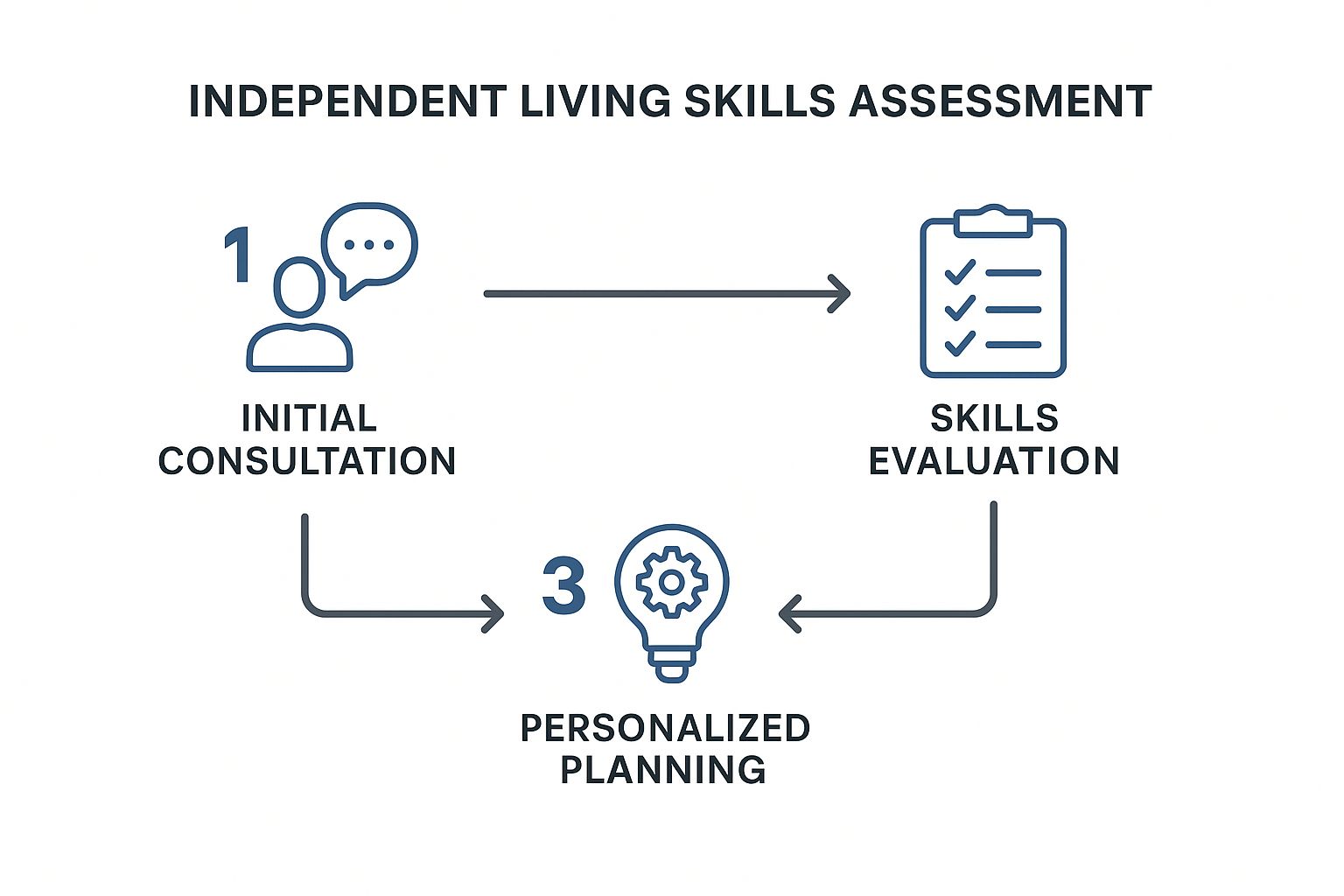
As you can see, each step builds on the last—from conversation to practical observation, all leading to a personalised strategy.
This collaborative approach ensures that the final report isn't just a document, but a true reflection of your abilities, challenges, and what you want to achieve in your life.
Finally, you’ll get a comprehensive report. This document pulls everything together, summarising the findings and offering clear, practical recommendations for your NDIS plan. It directly connects your current skills to the supports you need, whether that's building capacity for greater community participation NDIS or tackling other personal goals.
Turning Your Assessment into a Stronger NDIS Plan
An independent living skills assessment report is so much more than a simple summary of observations—it’s a powerful tool for shaping your future. This detailed document gives you the solid evidence needed to justify the right supports in your NDIS plan, turning your goals into a funded reality.
Think of it as the blueprint that connects your personal aspirations to the resources you need to get there. The assessor's professional recommendations are the building blocks for a practical, effective plan that genuinely helps you live more independently.
From Findings to Funded Supports
Every observation and recommendation in your report can be directly linked to a specific type of support. This clear connection is exactly what makes the document so valuable when you’re advocating for the funding you need to achieve your goals.
For instance, if the assessment identifies a specific challenge like difficulty navigating public transport, this can translate directly into funded supports like:
- Travel Training: One-on-one sessions to build confidence using buses, trains, or trams.
- Assistive Technology: Funding for apps that help with real-time journey planning and navigation.
- Support Worker Hours: A support worker to accompany you on community outings while you build your skills and confidence.
This evidence-based approach takes the guesswork out of your NDIS application and clearly demonstrates your needs to the NDIS. Partnering with a skilled support coordinator can be a game-changer here. To understand this role better, check out our guide on maximising your NDIS plan through support coordination.
The report transforms abstract goals into actionable, fundable steps. It provides the "why" behind your funding requests, making your NDIS plan stronger, more personalised, and much more likely to be approved.
The impact of a well-structured assessment goes beyond just daily tasks; it can be a huge boost for economic independence, too. In fact, data from Australian skills assessment pilots shows that 66% of participants reported having a much better understanding of the national employment system after their assessment. This really shows how these evaluations build crucial skills for both everyday life and getting into the workforce. You can discover more about these findings in the full government report.
How to Find the Right Assessor for You
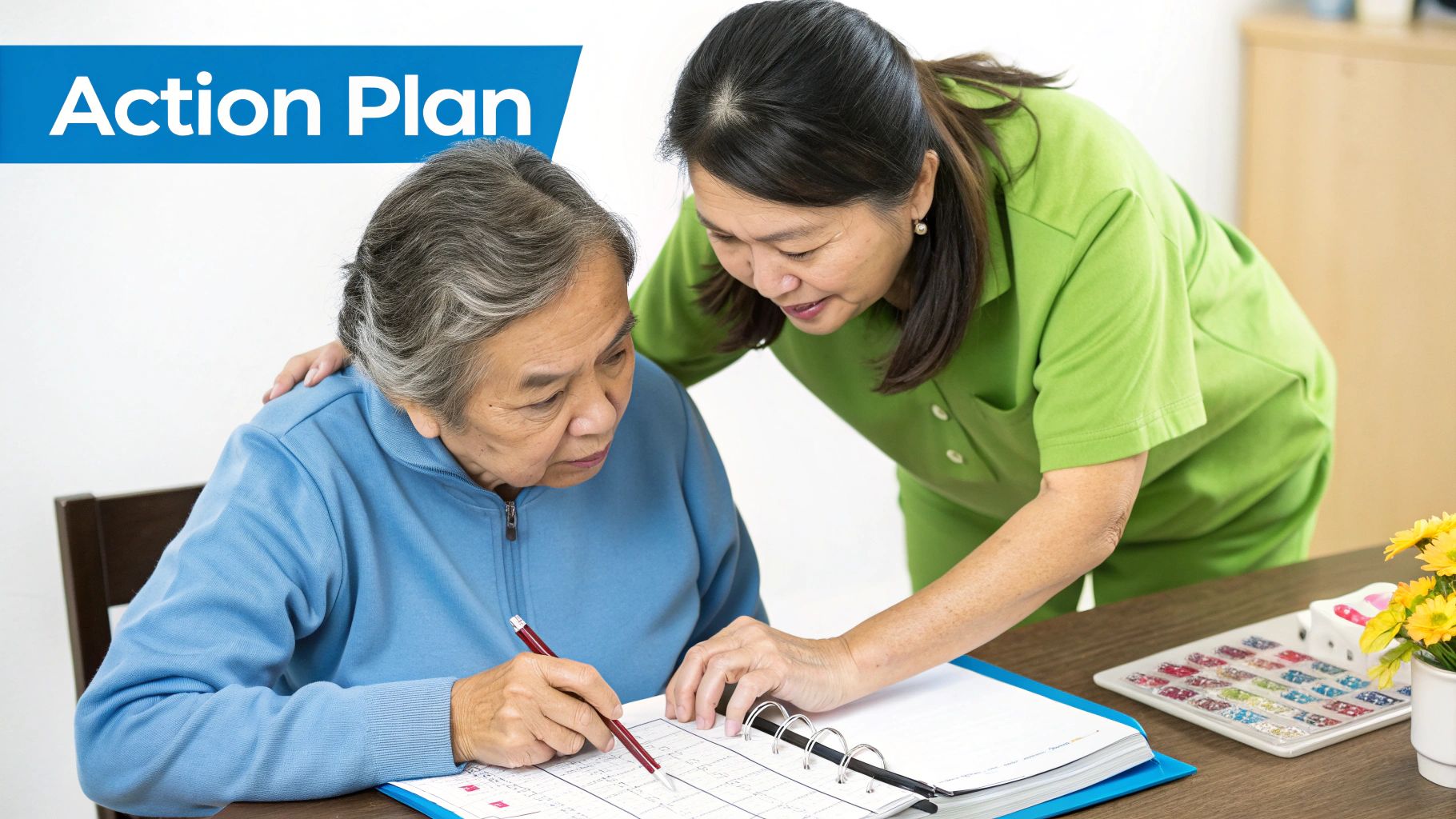
Choosing the person who will conduct your independent living skills assessment is a really big deal. This professional, typically an Occupational Therapist (OT), isn't just ticking boxes; they’re helping you map out your journey toward greater autonomy. It’s vital you find someone who feels like the right fit.
Beyond qualifications on paper, the personal connection is what makes all the difference. You want an assessor who truly listens, explains things clearly, and genuinely respects your goals for your life. This turns what could be a cold, clinical process into a real, collaborative partnership.
Key Credentials to Look For
As you begin your search, there are a couple of must-haves to check for. These credentials ensure the professional has the proper training and is held to high industry standards.
- AHPRA Registration: First things first, make sure the OT is registered with the Australian Health Practitioner Regulation Agency (AHPRA). This is the national benchmark for all health professionals in Australia.
- NDIS Experience: You’ll want an OT who has specific, proven experience working with NDIS participants and conducting functional assessments. They'll know exactly how to structure a report that clearly communicates your needs and justifies the right supports.
The right assessor does more than evaluate skills; they become a trusted advocate. Their expertise in creating a comprehensive report is vital for securing the funding you need to thrive.
Once you’ve got those basics covered, it's time to ask questions to see if their approach clicks with yours. This is how you find out if they share your vision for what independence looks like. And if you need a hand with the next steps, our article on how to nominate Vana Care as your NDIS provider in PACE can guide you through the process.
Your Questions About ILS Assessments, Answered
It's only natural to have a few questions when you're thinking about an independent living skills assessment. Knowing what to expect can make the whole process feel much less daunting. We've put together some of the most common questions we hear to give you clear, straightforward answers.
Think of this as your quick guide to the practical side of things. Our aim is to clear up any confusion and help you feel confident and prepared.
How Long Does an Assessment Take?
There’s no one-size-fits-all answer here, because the assessment is built around you. Generally, the entire process is spread over a couple of weeks to make sure nothing is rushed.
Here’s a rough breakdown of what that might look like:
- An initial chat to get to know you and your goals, which usually takes about 1-2 hours.
- Observing how you go about daily tasks at home or in the community. This part could take 2-4 hours, often broken into shorter visits.
- If you’re happy for them to, the assessor will also spend some time talking with your family or other support people.
After the last session, your assessor will put together a detailed report, which you can expect to receive within a few weeks.
Will I Have to Do Things I'm Not Comfortable With?
Absolutely not. A good assessment is a partnership, and you’re always in the driver's seat. Your assessor will walk you through every potential activity beforehand, and you have the final say. If something feels uncomfortable, you just say so.
The whole point is to get a picture of your current skills in a safe and supportive way—not to cause stress. Your comfort and consent are the top priorities from start to finish.
What Happens If the Assessment Shows I Need a Lot of Support?
That’s actually great news. The main reason for an independent living skills assessment is to pinpoint exactly what support you need. A report that clearly outlines these areas is an incredibly powerful tool for your NDIS plan.
It provides the NDIS with solid evidence to fund the right supports for you, whether that’s more hours with a support worker or specialised therapy to build new skills. It’s the first real step toward building the independent life you want. In fact, research from a Western Australian study showed how proper assessment tools can reliably track skill development over time, from major cities to remote areas. You can read more about these research findings to see why this is so important.
At Vana Care, we believe that understanding your needs is the first step toward building a life of independence and joy. If you have more questions or are ready to explore your options, our friendly team is here to help. Visit us at Vana Care to learn how we can support your journey.


